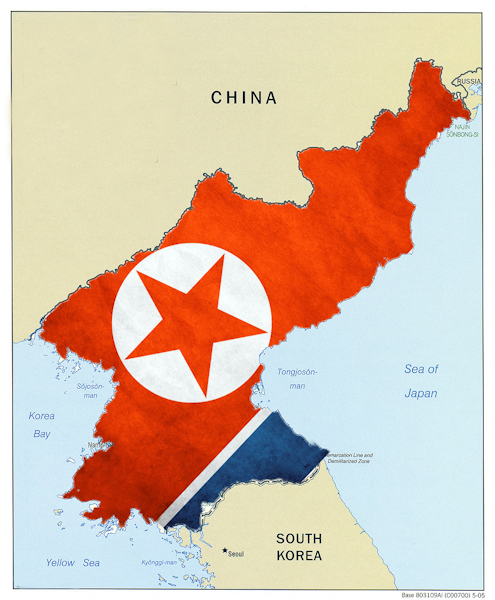As tensions continue to rise on the Korean Peninsula and the surrounding region, North Korea is threatening countries with military action, including nuclear attacks.
“North Korea is essentially a barking dog – they make a lot of noise,” Christian Asbill, an Oklahoma Christian University senior studying political science, said. “They make a lot of these statements, but they do not have what it takes to back them up…they’re just looking to gain our attention.”
For over a month, North Korea has remained a hot topic for severing diplomatic ties, heightening aggressive rhetoric and announcing a state of war, but as of yet has failed to initiate any acts of violence against its foes. North Korea’s current actions beg the question: how seriously can North Korea be taken?
Many theories have circulated as to why North Korea has increased aggression and what their next move will be. Asbill said North Korea is difficult to decipher because of their isolationist nature.
“No one can really accurately form a model to predict what’s going to happen,” Asbill said. “It’s all kind of up in the air.”
A part of the mystery falls on North Korea’s new leader, the 29-year-old Kim Jong-un who became the supreme leader after his father Kim Jong-il died in December 2011. Asbill said many people think the current round of threats is Kim Jong-un’s effort to obtain a firmer grasp on his power.
“Some think this is him trying to establish his dominance over the country,” Asbill said. “He’s doing it by playing up this militaristic, anti-western rhetoric.”
However, a definitive reason for North Korea’s actions is not clear. Everything about North Korea has been speculation, Asbill said.
“There is also those who think that this is perhaps the real deal,” Asbill said. “That North Korea has finally reached a breaking point where they are determined that they are going to push back against South Korea and their Western allies with military force.”
While both theories have some validity, they are just that: theories.
“It’s more or less the international community and the United States having to play it by ear to see what the outcome is going to be,” Asbill said. “There’s definitely been a much more aggressive response to this round of militaristic rhetoric from North Korea.”
The current round of aggressive rhetoric started Feb. 24 when North Korea warned U.S. military officials in South Korea that their annual joint military exercises with South Korea, which would start early March, could set off a war.
The speech of North Korea intensified when on March 8 the United Nations ordered new economic sanctions against North Korea, despite the country’s threat of retaliation. North Korea responded by cutting off a phone hotline to the South and nullifying the Korean War armistice, credited for the nearly 60 years of uneasy peace.
On March 16 Defense Secretary Chuck Hagel announced that the Pentagon would deploy additional ballistic missile interceptors on the Pacific coast. And then on March 22, in retaliation for training missions by American B-52 bombers over South Korea, North Korea threatened to attack American military bases in Japan and on the Pacific island of Guam.
On March 29 the U.S. carried out a long-range practice mission with two nuclear-capable B-2 stealth bombers flying over South Korea.
On March 31 North Korea stated that the Korean Peninsula is back in “a state of war,” and it threatened to shut down a factory complex jointly operated with South Korea.
North Korea said it would withdraw all its workers and temporarily suspend operations at that factory complex.
On April 3 North Korea announced plans to restart a shutdown nuclear reactor. The following day the U.S. announced plans to speed-up deployment of missile defense systems to Guam.
China and Japan have also announced plans to beef-up their defense in the region. Asbill said the U.S. response to North Korea has been lax.
“The reason we have not made any real big responses and made them a big issue is because in the past it has never turned out to be a big issue, so why waste time on it?” Asbill said. “We don’t want to fuel their aggressive rhetoric with any sort of acknowledgement.”
Min Suk Jang, an Oklahoma Christian junior from Seoul, South Korea, said that the current situation with the North is nothing out of the ordinary.
“South Korean people always know North Korea wants to fight,” Jang said. “It’s the same situation.”
Jang’s family in South Korea has not been affected by any of the aggressive speech.
“It’s just normal like here,” Jang said. “We always want peace, but North Korea wants to fight. I’m not nervous, but I don’t want a fight.”
South Korea depends on U.S. military support to maintain a defense along its border. Jang said that relations between his country and the U.S. are vital.
“Our current military population is not enough,” Jang said. “I hope that America continues to support our country and maintains our security on the border.”
Even with intensifying hostile speech, Asbill doesn’t think the situation with North Korea would escalate into an open war.
“Ultimately, at the end of the day, I think that North Korea is not something that needs to be feared,” Asbill said. “I don’t think this is something we necessarily need to be overly worried about, but at the same time, we should recognize that anything could happen.”













Be First to Comment